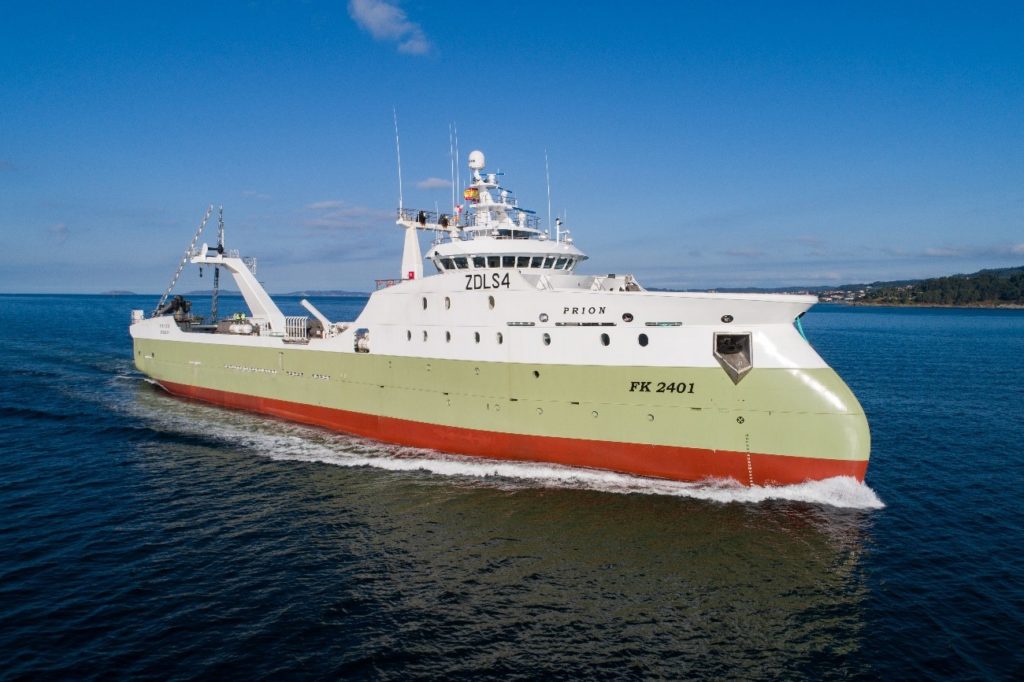Petrel Fishing Company expands its fleet with the Prion, the largest, most modern freezer vessel in Spain, designed to operate in the Falkland Islands with cutting-edge technology and improved safety and comfort.
Petrel Fishing Company Ltd, jointly owned by the Pescapuerta Group and the Fortuna Group (its partner in the Falklands), has received its new freezer vessel, the Prion, which will be operating in the Falklands fishing grounds. The Prion has a GT of nearly 2,500, and measures 85 metres long and 14 metres wide, making it the largest freezer vessel built in recent years. The Prion has been designed and developed entirely between the shipyard and the shipowner’s technical team.
The handover of the vessel was formalised at an event held at the Nodosa shipyard, chaired by the President of the Xunta, Alfonso Rueda, with the participation of José Puerta Prado as President of the Pescapuerta Group and Stuart Wallace representing the Fortuna Group. The event has been attended by some 400 guests, between shipyard employees, customers, suppliers, collaborators and different authorities.
Margarita Prado and Lilian Wallace acted as sponsors at the launching of the ship.
The Prion becomes the most modern freezer vessel built in Spain. It’s a display of high technology, energy efficiency, optimisation in the processing of catches, respect for the environment, comfort and safety for the crew. All these features were basic premises on which the shipbuilding company has placed great emphasis from the beginning of the design and which the shipyard has been shaping into reality.
In welcoming this new vessel, Pescapuerta and Fortuna have taken a step further in renovating their fleet, which began three years ago with the construction of the Falcon, also built by Nodosa and which has had excellent results in its first fishing endeavours.
During the presentation ceremony, José Puerta Prado took the opportunity to commemorate the figure of his father, José Puerta Oviedo, founder of the Pescapuerta Group. All attendees were presented with a recently published book, explaining the origins of Pescapuerta and the “dreams come true” of its founder.
ENERGY AND ENVIRONMENTAL EFFICIENCY
Both the main and auxiliary engines comply with the stringent regulations of the fishing industry in terms of emissions control, and have been designed to operate at the best engine speeds at all times, thus ensuring lower polluting emissions and increased fuel efficiency. Ultimately, energy efficiency is environmental efficiency. For this purpose, an Orcan energy recovery system has been added to convert the waste heat generated in the ship into electrical energy for on-board consumption, resulting in a reduction in the ship’s consumption, making it more efficient and, therefore, more environmentally friendly as emissions are significantly cut.
As for the refrigerant, ammonia has been chosen again (like in the previous unit). It’s more environmentally friendly as it exists in nature, and has greater cooling capacity than other refrigerants.
A relevant aspect in the pursuit of greater efficiency in navigation and operation, which directly results in savings in energy consumption and, ergo, greater environmental benefits, is the design of a completely optimised hull, where the figure of an inverted bow stands out on its own merits as a result of previous experiences and customised studies, resulting in a very innovative look.
Other noteworthy elements that reinforce environmental protection include the choice of silicone patents for the hull (which have proven to be more ecological and efficient in consumption for this fishing ground), a tank to store biodegradable waste during hoisting and rigging, an approved incinerator to avoid the dumping of waste into the sea and state-of-the-art bird defences to protect seabirds.
CREW SAFETY AND COMFORT
Thanks to an innovative, efficient design, the number of people required for deck manoeuvres is reduced. Furthermore, the crew will be better protected from the weather, thus minimising risks.
A cabin is also included for the comfort and safety of fishery observers.
Three modern cranes installed on board will allow, due to their location and power, all types of manoeuvres to be carried out on deck in the fastest and safest way, possible especially when loading and unloading.
